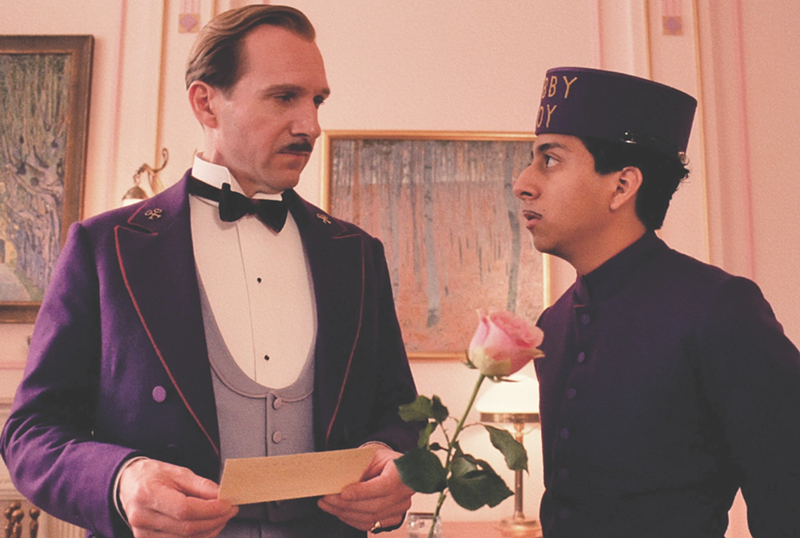The Grand Budapest Hotel is the latest release from Wes Anderson, the precious stylist who seems intent on claiming the distinction of being the current iteration of early Woody Allen — meaning he’s adept at aggressively being himself. During the press screening, my mind wandered away from the painterly details captured, at times, in exquisite relief to an emotional component that, over the last few films, has become a dominant ingredient in a comforting stew. From the start, I’ve appreciated Anderson’s film at what always felt like an imposed distance. There has never been a lack of wit or narrative focus — and how could there have been in Bottle Rocket, Rushmore, The Royal Tenenbaums, The Life Aquatic with Steve Zissou and The Darjeeling Limited — but that collection of titles throws a daunting stiff-arm my way when it comes to emotional engagement. The characters are primarily brilliant types, intellectual giants confounded by interpersonal interactions with decidedly lesser beings; they live in rarified air, a world of exclusiveness, removed from normalcy. Anderson’s films lived for and only in those tight well-composed frames.
But all that began to change for me with Fantastic Mr. Fox, and I was quite astonished. How could it be that Anderson figured out how to tap into (and connect with) his humanity with an animated tale about a wily fox and the family he creates and chooses to go into battle with against a hard-hearted trio of human businessmen? Mr. Fox (aided immensely by the warm vocal talent of George Clooney) is suave and uber-urbane, but he’s in touch with the wild side of his animal nature. What won me over, though, was the tenderness in his exchanges with his son Ash (Jason Schwartzman) and his nephew Kristofferson (Eric Anderson), the willingness to see vulnerability and not shy away from it. Ash struggles once his cousin enters the picture because he sees competition for his father’s affections and the attention of his peers. Papa Fox doesn’t handle things well immediately, but he makes the necessary adjustments without resorting to simplistic tough-love moves as he reaches out to the ones he loves.
Anderson delved deeper into this notion with Moonrise Kingdom. Sam (Jared Gilman) and Suzy (Kara Hayward), young lovers on the run in that enchanted Kingdom, need all the help they can get, especially in a world where love is a precious commodity. Enter Captain Sharp (Bruce Willis), one of the few adults who willingly takes Sam under his wing and treats him not as an equal (which would seem to be a default in Anderson’s world of precocious children ever on the verge of advanced maturity), but as a youngster in need of guidance and a degree of protection. There is a recognized kinship between Sharp and Sam that Anderson appears to know something about.
And, once again, that dynamic shows up in Hotel between Gustave H (Ralph Fiennes), the legendary concierge, and Zero Moustafa (played by newcomer Tony Revolori in the main exchanges of primary storyline). Gustave is a tough boss, the commander of the ground troops at the hotel who, in short order, latches onto the new lobby boy and senses there’s something worth grooming in the lad that could lead to greatness.
But as soon as Gustave finds himself caught up in a complex inheritance scam and a trumped-up murder charge, he has no other choice but to place his trust in his sidekick while at the same time leaping improbably to defend the young man’s honor in key moments. It is this heady impulse — first displayed during their initial train ride to the reading of the will of Madame D (Tilda Swinton under a pound cake’s worth of pancake makeup), when Zero is harassed by the Gestapo-like military force for not having proper papers — that drew me in.
Hotel achieves a powerful emotional buzz based on the relationship between Gustave and Zero. So much of the narrative centers on that interplay and connection, the pair tricks us into believing they are still together even when they are separated. Their bond is heart-felt and more fully realized than the intellectual accents we’ve come to expect from Anderson. Much of the praise will be heaped upon Fiennes, who is indeed dazzling and livelier than we are used to seeing him. Maybe it’s the challenge of working opposite a newbie like Revolori, who brings a wide-eyed appeal that’s never wholly innocent. I would rather confer responsibility on the tough and tender hand at the helm.
Wes, darling, show us more, please.
(Opens Friday at Esquire Theatre) (R)Grade: A
CONTACT TT STERN-ENZI : [email protected]


